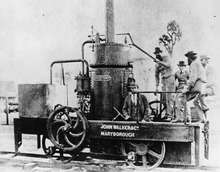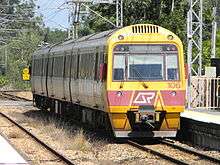Walkers Limited
|
QR 100 class at Landsborough in April 2010 | |
| Industry | Engineering |
|---|---|
| Successor | Downer Rail |
| Founded | 1863 |
| Founder | John Walker |
| Headquarters | Maryborough |
| Products |
Railway locomotives Railway rolling stock Ships |
| Parent | Evans Deakin Industries |
Walkers Limited was an Australian engineering company, based in Maryborough, Queensland. It built ships and railway locomotives. The Walkers factory still produces railway locomotives and rolling stock as part of Downer Rail.
History
.jpg)




In 1863 John Walker and three friends set up the Union Foundry of John Walker & Co in Ballarat. In 1867 a branch was opened in Maryborough.[1]
The Ballarat assets were disposed of in 1879 and in 1884, the business became a limited company under the title John Walker & Co Limited, being renamed Walkers Limited in 1888. The company produced most of the parts for machinery at sugar mills.[2]
In 1980 Walkers Limited was sold to Evans Deakin Industries. It was included in the purchase of Evans Deakin by Downer Group in March 2001 and today the Maryborough factory continues to operate as part of Downer Rail.[3][4]
In 2003 Bundaberg Foundry Engineers completed the acquisition of the Walkers Sugar Business and moved to change the operating name to Bundaberg Walkers Engineering in January 2008.[5]
Ships
In 1884, the firm began work on 5 hopper barges for the Queensland Department of Harbours & Rivers. During construction the decision was taken to convert them to also serve as Auxiliary Gunboats, which made them the largest warships built in Australia before federation. During World War II, Walkers constructed two River class frigates, a Bay class frigate and seven Bathurst class corvettes, in addition to other smaller vessels. Post war naval contracts included seven Attack class patrol boats in the late 1960s and eight Balikpapan class landing craft heavy in the early 1970s. After the completion of the latter, Walker's Maryborough shipyard closed in 1974.
Royal Australian Navy ships
- 1 Bay class frigate: HMAS Shoalhaven
- 2 River class frigates: HMAS Burdekin and Diamantina
- 7 Bathurst class corvettes: HMAS Bowen, Cairns, Gladstone, Maryborough, Rockhampton, Tamworth and Toowoomba
- 7 Attack class patrol boats: HMAS Advance, Aitape, Arrow, Bandolier, Barbette, Ladava and Lae
- 8 Balikpapan class landing craft heavy: HMAS Balikpapan, Brunei, Labuan, Tarakan, Wewak, Salamaua, Buna and Betano
- 9 Koala class Boom Defence vessel HMAS Kimbla
Trains
The company's first locomotive was built at Maryborough in 1873 for William Pettigrew's (now heritage-listed) Cooloola Tramway; it was called "Mary Ann" as it was the name of the daughter of William Pettigrew and also the name of the daughter of his business partner William Sim.[6][7][8] The first major contract for locomotives came in 1896, when an order for thirty B15 class steam locomotives was placed by Queensland Railways.[1] In the 1960s Walkers offered a diesel-hydraulic unit to Queensland's sugar operators. Although not successful, it did sell six to BHP, Whyalla from 1962. It had more success with its DH class shunter with over 130 built for Queensland Rail, the New South Wales Government Railways, Emu Bay Railway and Western Australian Government Railways.
Steam locomotives
- 46 Queensland B class
- 122 Queensland PB15 class
- 45 Queensland C16 class
- 138 Queensland C17 class
- 6 Queensland C19 class
- 83 Queensland B18¼ class
- 25 Queensland BB18¼ class
- 20 Victorian Dd class
- 20 Commonwealth Railways KA class
- 8 Commonwealth Railways C class
- 40 South Australian T class
- 3 Tasmanian Government Railways Q class
Diesel electric locomotives
Diesel hydraulic locomotives
- 6 BHP Whyalla DH class
- 3 Emu Bay Railway 10 class
- 73 Queensland Railways DH class
- 50 New South Wales 73 class
- 7 Emu Bay Railway 11 class
- 5 Western Australian Government Railways M class
Electric locomotives
Electric multiple units
- 264 Queensland Rail EMU carriages
- 36 Queensland Rail SMU200 carriages
- 90 Queensland Rail SMU220 carriages
- 20 Queensland Rail ICE carriages
- 30 Queensland Rail IMU100 carriages
- 12 Queensland Rail IMU120 carriages
- 96 Transperth A series carriages
- 90 Kuala Lumpur Metro Line 3 & 4 light rail vehicles[9]
Tilt Trains
- 12 Queensland Rail Tilt Train carriages
References
- 1 2 West, AM (1994). Made in Maryborough. Brisbane: Australian Railway Historical Society, Queensland Division.
- ↑ "Maryborough". Queensland Places. Centre for the Government of Queensland, University of Queensland. Retrieved 26 June 2012.
- ↑ Evans Deakin Industries Limited delisted.com.au
- ↑ Annual Report 30 June 2001 Downer EDI
- ↑ History Bundaberg Walters
- ↑ "MESSRS. PETTIGREW AND SIMS' RAILWAY.". The Queenslander (Brisbane, Qld. : 1866 - 1939). Brisbane, Qld.: National Library of Australia. 8 November 1873. p. 10. Retrieved 31 October 2015.
- ↑ "WALKERS BUILD LOCOS.". Maryborough Chronicle (Qld. : 1947 - 1954). Qld.: National Library of Australia. 14 August 1952. p. 2. Retrieved 31 October 2015.
- ↑ "Pettigrew's Cooloola Timber Tramway Complex (entry 602819)". Queensland Heritage Register. Queensland Heritage Council. Retrieved 1 August 2014.
- ↑ "EDI Wins Light Rail Order Extension" Railway Digest June 1995 page 9
